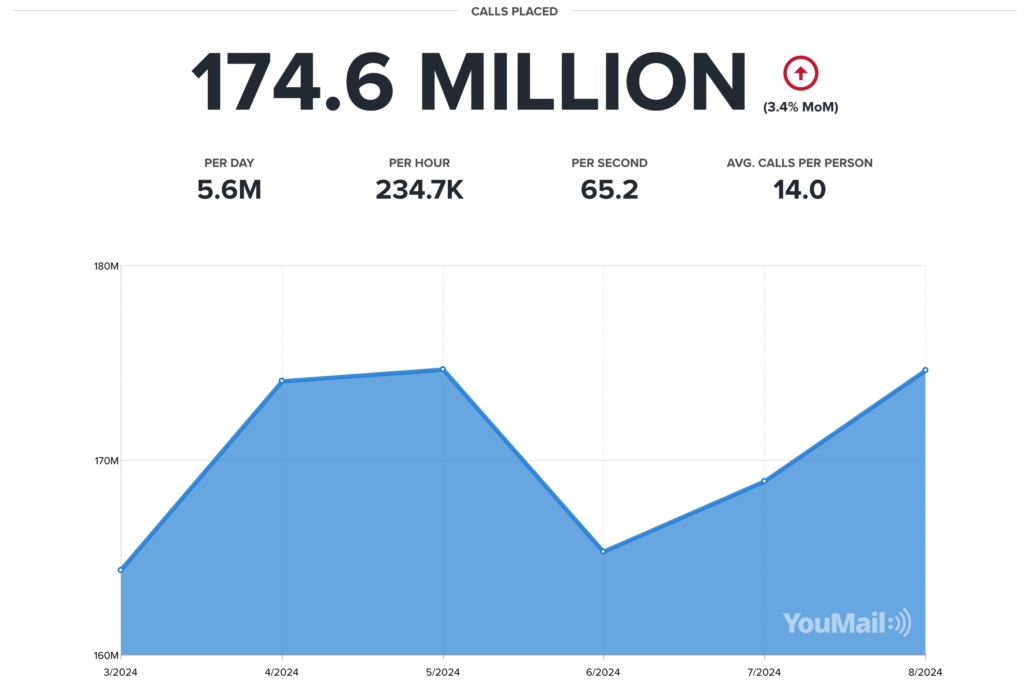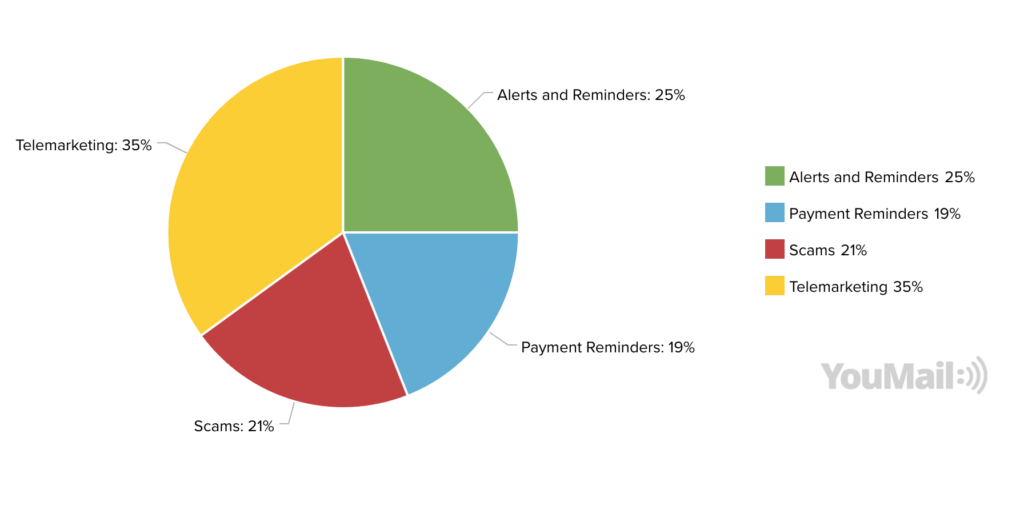Ohio, the Buckeye State, experienced a significant uptick in robocalls in August 2024, with 174.6 million calls placed across the state, a 3.4% increase from the previous month. This translates to an average of 14 calls per person, with 5.6 million robocalls made daily, and 234,700 per hour. The surge in robocalls underscores the growing challenge Ohioans face in dealing with spam and unwanted calls.
In this article, we’ll dive into the robocall trends in Ohio, including which cities and areas are most affected, and provide insights into the top 25 robocallers in August 2024. We’ll also cover ways to protect yourself from these nuisances, including the use of YouMail’s spam-blocking technology, and how to report these calls to local authorities and the Federal Trade Commission (FTC).
Ohio Robocall Data Breakdown (August 2024)

- Total Calls Placed: 174.6 million
- Increase from Previous Month: +3.4%
- Average Calls Per Day: 5.6 million
- Calls Per Hour: 234,700
- Calls Per Second: 65.2
- Average Calls Per Person: 14.0
Robocalls by Category

- Telemarketing: 35%
- Alerts and Reminders: 25%
- Scams: 21%
- Payment Reminders: 19%
Ohioans are bombarded with telemarketing calls, which make up the largest share at 35%, followed by alerts and reminders. However, scams still account for over a fifth of all robocalls, highlighting the constant threat of phone-based fraud.
Top 25 Robocallers in Ohio (August 2024)
Here’s a look at the most prolific robocallers targeting Ohio residents in August 2024, along with the type of calls they made:
- 844-206-9035 Payment Reminder
- 866-914-5806 Policy Cancellation Alert
- 800-955-6600 Bank/Credit Card Payment Reminder
- 800-733-2767 Tax Debt Reduction Scam
- 866-716-9062 Financial Customer Call
- 888-892-2253 Policy Cancellation Alert
- 908-829-0335 Unknown Robocaller
- 844-659-7003 Payment Reminder
- 866-408-9541 Medical Customer Call
- 844-863-7350 Mortgage Loan Spam
- 888-330-9109 Mortgage Loan Spam
- 866-890-3387 Unknown Robocaller
- 866-434-6037 Debt Collector
- 800-321-9637 Loan Payment Reminder
- 501-710-5914 Unknown Robocaller
- 866-456-0677 Bank/Credit Card Payment Reminder
- 419-569-4169 Unknown Robocaller
- 866-532-0423 Bank/Credit Card Payment Reminder
- 866-680-8628 Medical Scam
- 877-255-5923 Financial Customer Call
- 877-836-5643 Bank/Credit Card Payment Reminder
- 614-456-0079 Renewal Reminder
- 866-408-4070 Bank/Credit Card Payment Reminder
- 480-550-3210 Unknown Robocaller
- 312-818-5250 Unknown Robocaller
Ohio’s Area Codes and Robocall Impacts
Ohio is home to several area codes, and each is affected differently by robocalls:
- 216, 440, 330: Cleveland and its suburbs face a high volume of telemarketing and debt collector calls.
- 614, 380: Central Ohio, including Columbus, receives many scam calls related to payment reminders.
- 513: Cincinnati and southwestern Ohio see a blend of telemarketing and alerts.
- 419, 567: Northwestern Ohio, including Toledo, faces a high number of telemarketing and alert-related robocalls.
- 937, 234, 330: Dayton and northeastern Ohio experience many debt collection and financial scam calls.
Protecting Yourself from Robocalls: YouMail to the Rescue
To combat the rising tide of spam calls, many Ohio residents have turned to services like YouMail. YouMail’s spam-blocking technology detects and blocks robocalls before they reach your phone. Here’s how it works:
- Automatic Call Blocking: YouMail identifies spam calls and plays a ‘this number is out of service’ message to the caller, preventing future calls.
- Customizable Call Blocking: You can manually block specific numbers, such as those frequently reported as scams, using the YouMail app.
- Scam Alerts: YouMail alerts you when a call is suspected to be a scam, like an IRS fraud attempt or a debt collection scheme.
- Available on Android and iOS: YouMail works across all major platforms, offering seamless protection for both Android and iPhone users.
YouMail’s Privacy Scan: Safeguarding Your Personal Information
YouMail’s Privacy Scan feature offers additional protection by helping users detect if their personal information is exposed online. This free scan:
- Identifies Online Exposure: It checks for personal data, such as your phone number or email, available online that scammers could exploit.
- Protects Against Identity Theft: By removing exposed information, you can prevent scammers from using your details for fraudulent purposes.
- Provides Continuous Monitoring: YouMail continuously monitors for future data breaches, ensuring ongoing protection of your sensitive information.
Reporting Robocalls in Ohio
If you’ve received spam or robocalls, there are several ways to report them in Ohio:
- State Consumer Protection Agency: Ohio’s Consumer Protection Section, part of the Attorney General’s office, handles complaints about unwanted calls. You can file a complaint on their website.
- Federal Trade Commission (FTC): The FTC enforces the National Do Not Call Registry and allows users to report robocalls directly to their consumer division.
- Federal Communications Commission (FCC): The FCC deals with complaints regarding unlawful robocalls and telemarketing scams. You can submit your complaint through their online portal.
Download YouMail and instantly stop spam calls, texts, and voicemail.
FAQs
1. What is the average number of robocalls an Ohioan receives per month? The average Ohioan received about 14 robocalls in August 2024.
2. What is the most common type of robocall in Ohio? Telemarketing calls are the most common, making up 35% of all robocalls in the state.
3. How can I block robocalls on my phone? You can use spam-blocking apps like YouMail, which automatically blocks robocalls and provides scam alerts.
4. How do I report a robocall in Ohio? You can report robocalls to the Ohio Attorney General’s Consumer Protection Section, as well as the FTC and FCC.
5. How does YouMail’s Privacy Scan work? YouMail’s Privacy Scan identifies if your personal information is exposed online, helping to prevent identity theft by removing this data.
Ohioans are no strangers to robocalls, but with tools like YouMail and clear reporting avenues, they can better protect themselves from these intrusive calls. Be sure to tell us your experience with spam calls in the comments below!





